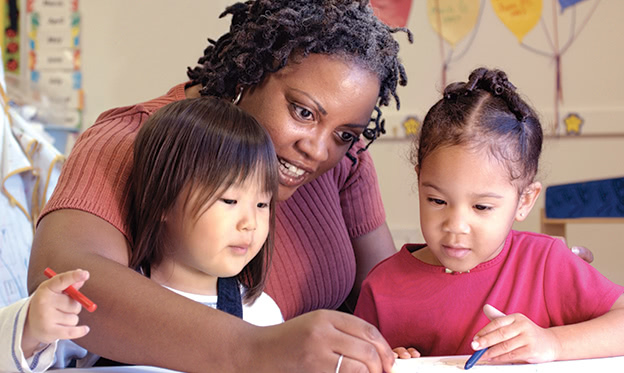
Section
Child Care for Toddlers
Like child care for babies, toddler child care should be based on a close, caring relationship between your child and 1 or 2 caregivers. Close relationships help children feel secure.
Look for a caregiver who will encourage your child’s interests and social skills. The caregiver should also help your child learn to talk. Look for small groups of children with each caregiver and a daily routine with lots of activities.
Where to Find Help
Help with discipline problems and parent stress; child abuse prevention.
1-800-422-4453
Information on quality child care, help finding child care.
1-800-424-2460
Book about common childhood health problems, included in Kit for New Parents.
Things You Can Do
Make Time to Find the Right Caregiver
There may be a waiting list. Start looking early.
Ask other parents about programs or caregivers they like.
Visit several centers or homes.
For Your Child’s Health and Safety
Do not take a sick child to child care. Have a plan for when your child is sick.
Ask your child about each day. Listen to what he says.
If your child says he is being treated badly or ignored at child care, take it seriously. If he comes home hungry or dirty, or has unexplained bruises, do not ignore it. Call the Child Protective Services number for your county, or call the Childhelp National Child Abuse Hotline.
If a Relative Cares for Your Child
Talk about ways to help your child learn, such as reading stories, playing games, and making things together.
If your child is learning to use the toilet, discuss this with your relative. Make sure your child is not being shamed or forced to give up diapers before he is ready.
Explain how you set limits and use consequences with your child. Talk about how you want guidance to be given.
Ask who else may be visiting the home, to ensure your child’s safety.
Checklists
Child Care Checklist
Checklist for Babies’ Child Care.
Helping Your Toddler Learn
Your toddler’s caregiver should provide lots of ways to learn through play. This includes active games and group activities, as well as puzzles, toys, and books.
Children with Disabilities
Make sure the caregiver has the training, equipment, and resources needed to care properly for your child. The right care can make a big difference in your child’s future.
Early Head Start and Head Start
Head Start helps young children get ready for school. It is mostly for 3- and 4-year-olds.
Early Head Start is for children from birth to age 3, along with their parents. Children get help with language skills, getting along with peers, and handling their emotions. Adults get help with parenting challenges. It is free for families who qualify. Call your school district, or see the online Head Start Locator.

Your toddler’s caregiver should provide lots of ways to learn.